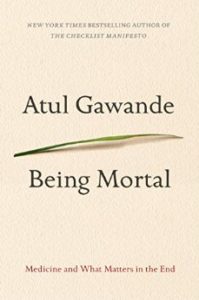 Physician Atul Gawande has written a powerful, moving book on aging and death. Being Mortal provides a logical, clear-eyed view of dying and what is important.
Physician Atul Gawande has written a powerful, moving book on aging and death. Being Mortal provides a logical, clear-eyed view of dying and what is important.
Gawande emphasizes the importance of questions we ask someone whose death is in the near future. Ask “If time becomes short, what is most important to you?” Most people will want to be relieved of pain, to be among those they love, and at peace. Many doctors tend to try to prolong life, even though life has ceased to be one of quality. Studies have shown that people in hospice, where patients are kept comfortable and without extensive treatment, live longer and happier.
Older patients and their families often feel desperate in the face of terminal illnesses; they’ll try anything to prolong life, whatever the improbability, the misery, or the cost. Instead, we should consider how to face mortality and preserve the essence of a meaningful life. When we ask our loved ones what they want, what is most important, what are their worries, the answers and the steps to be taken become clear.
As health conditions worsen, mounting crises often create a series of temporary rescues. Gawande terms this ODTAA, One Damn Thing After Another. Perhaps a better way to face these crises is to explore the idea of living for the best possible day today instead of sacrificing time now for time later.
The science of medicine is to enable well-being. Whenever serious illness or injury strikes, vital questions should be asked: What is your understanding of this condition and the likely outcome? What trade-offs are you willing or not willing to make? Being Mortal gives readers the means and confidence to raise and answer these questions.
Although the subject matter is serious, the book is written in an encouraging, inspiring way, sometimes even with humor. Atul Gawande has left a lasting impression on how I look at terminal illness and the importance of preparedness. Being Mortal is a worthy addition to our personal library.

